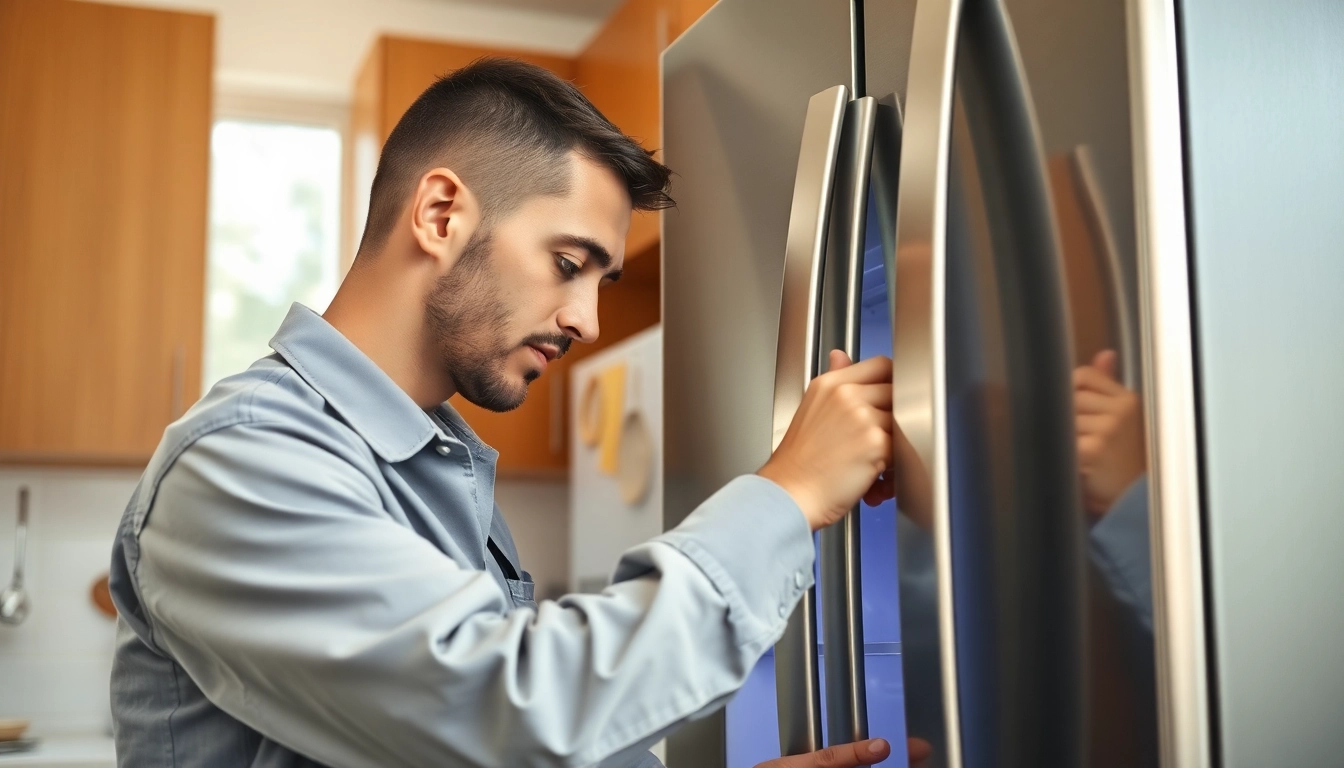Understanding Common Refrigerator Issues
Refrigerators are essential appliances in any kitchen, playing a critical role in food preservation. However, like all machines, they can encounter problems that affect their performance. Recognizing the signs of malfunction is the first step toward ensuring your appliance runs efficiently. Over time, neglect and wear can lead to common issues that may require attention or refrigerator repair.
Identifying Signs of Refrigerator Malfunction
The impact of a malfunctioning refrigerator can be significant, not only leading to spoiled food but also increasing energy bills. Some common signs of trouble include:
- Unusual Noises: If your refrigerator is making clicking, buzzing, or humming sounds, it may indicate a problem with the compressor or fan.
- Temperature Fluctuations: Inconsistent internal temperatures can lead to food spoilage. If your food is freezing or not cold enough, it’s time to check the appliance.
- Water Leaks: Puddles of water around the refrigerator may signal a clogged defrost drain or a malfunctioning water line.
- Foul Smells: Persistent odors could stem from spoiled food or a problem with the appliance itself.
Common Problems That Prompt Refrigerator Repair
There are several issues that frequently necessitate refrigerator repair, including:
- Compressor Failure: The compressor is the heart of your refrigerator. If it fails, the appliance won’t cool properly.
- Condenser Coils: Dirty or blocked condenser coils hinder heat dissipation, forcing the refrigerator to work harder and less efficiently.
- Thermostat Issues: A malfunctioning thermostat fails to regulate temperature, leading to food spoilage.
- Fans: Both the evaporator and condenser fans play crucial roles. If one fails, cooling can be compromised.
Assessing the Performance of Your Refrigerator
Regularly assessing your refrigerator’s performance can help catch issues early. Steps to assess include:
- Checking food temperatures with a thermometer.
- Inspecting the door seals for leaks, which can affect temperature retention.
- Listening for unusual sounds that may indicate mechanical issues.
- Monitoring energy bills for unexpected increases that might signal inefficiency.
DIY Refrigerator Repair Techniques
If you encounter minor issues with your refrigerator, some repairs can be handled independently, saving time and money. However, it is critical to approach these repairs with the right tools and precautions.
Essential Tools for Refrigerator Repair
Before attempting any repairs, ensure you have the following tools handy:
- Adjustable wrench
- Screwdriver set (Philips and flathead)
- Multimeter for electrical diagnostics
- Vacuum or brush to clean condenser coils
- Tube of food-safe silicone sealant for door seals
Step-by-Step Guide to Simple Repairs
Here’s a brief guide to performing some common DIY repairs:
Cleaning the Condenser Coils
A simple cleaning can restore efficiency. Unplug the refrigerator, access the coils (usually found at the back or underneath), and use a vacuum or brush to remove dust and debris.
Replacing Door Seals
To replace worn door seals, remove old seals and clean the door edges. Apply the new seal by following the manufacturer’s guidelines, ensuring a tight fit for optimal cooling.
Adjusting Temperature Settings
Sometimes, simply recalibrating the thermostat can solve cooling issues. Refer to the user manual for instructions on how to adjust the settings properly.
Safety Tips When Performing DIY Repairs
Safety should always come first. Here are a few essential tips:
- Unplug the refrigerator before starting any repair work.
- Use insulated tools to prevent electric shock.
- Work in a well-lit area to avoid accidents.
- Read the appliance’s manual before attempting repairs to understand specific components.
When to Call a Professional for Refrigerator Repair
Some problems may be too complex for DIY repairs and require professional assistance. Recognizing when to seek expert help is vital for the longevity of your appliance.
Identifying Complex Issues Beyond DIY
Certain issues necessitate the expertise of certified technicians. These include:
- Compressor Repair/Replacement: This is a complex repair that requires advanced knowledge and skills.
- Refrigerant Problems: Leaking refrigerants should be handled by professionals due to environmental hazards.
- Electrical Issues: Problems with internal wiring or components should always be addressed by a qualified technician.
Benefits of Hiring Certified Technicians
Opting for professional repair services comes with numerous advantages:
- Expertise: Technicians have specialized training and experience to diagnose and resolve issues effectively.
- Warranty Protection: Professional repairs can help maintain manufacturer warranties.
- Time-Saving: Professionals can often complete repairs more quickly than a DIY approach.
Cost Analysis of DIY vs. Professional Refrigerator Repair
When deciding between DIY and professional repair, consider these factors:
Cost of Parts
DIY repairs involve spending on parts, which can vary widely in price based on the component being replaced.
Value of Time
Assess the time you’d spend troubleshooting and repairing against the cost of professional services.
Long-term Savings
Sometimes a small investment in professional repair can lead to significant savings by extending the life of your refrigerator.
Maintaining Your Refrigerator for Longevity
Regular maintenance can prevent many common issues, ultimately prolonging the life of your refrigerator. Implementing a routine can save both money and headaches down the road.
Regular Maintenance Practices to Avoid Repairs
Consider these routines to keep your refrigerator operating smoothly:
- Clean the condenser coils at least twice a year to prevent dust buildup.
- Defrost the freezer if ice buildup exceeds a quarter-inch.
- Inspect door seals regularly to ensure closures are tight.
- Keep the refrigerator stocked and not overfilled to promote proper air circulation.
Understanding Refrigerator Components and Their Care
Knowledge of key refrigerator components can enhance your ability to maintain your appliance effectively:
- Evaporator Coils: Keep them clean to ensure efficient cooling and evaporation cycles.
- Thermostat: Regularly check its functionality and calibration.
- Fans: Make sure these components are unobstructed and functioning smoothly.
- Water Filters: Change the filters as recommended to maintain quality water and ice.
Seasonal Tips for Refrigerator Optimization
Each season presents unique challenges and opportunities for refrigerator maintenance:
- Summer: Higher temperatures lead to increased workload; ensure ventilation is clear.
- Winter: Check for frost buildup in the freezer section and defrost as needed.
- Back-to-School: Organize your refrigerator to promote efficiency during busy months.
- Holidays: Prepare your refrigerator for extra load during festive seasons by cleaning it thoroughly.
The Future of Refrigerator Repair and Technology
The landscape of refrigerator repair is continually evolving, driven by advancements in technology. Understanding these trends can help you prepare for the future of appliance maintenance.
Emerging Trends in Appliance Repair Services
Recent trends in appliance repair include:
- Remote Diagnostics: Technicians can troubleshoot issues remotely, often resolving problems more quickly.
- Eco-friendly Practices: Repair services are moving towards sustainable practices, including recycling old parts.
- Mobile Repair Services: Convenience is key; many providers now offer mobile repair units for on-the-go service.
Smart Refrigerators and Their Repair Needs
As technology advances, so do refrigerators. Smart refrigerators come equipped with features like built-in inventory systems and Wi-Fi connectivity, but this technology can present unique repair challenges, such as:
- Software Updates: Regular updates are necessary to maintain functionality and security.
- Connectivity Issues: Troubleshooting connectivity problems can require different skills than traditional repairs.
- Sensor Calibration: Smart refrigerators rely on sensors that may need to be calibrated for accurate temperature control.
How Technology Enhances Refrigerator Repair Efficiency
Technological advancements are making refrigerator repair more efficient. Some enhancements include:
- Data Analytics: Repair professionals can use data to predict failures and optimize repairs.
- Parts Availability: Technology allows for real-time tracking of inventory, ensuring quick access to necessary parts.
- Training Resources: Online training and resources are available to keep technicians updated on the latest technologies.














Leave a Reply